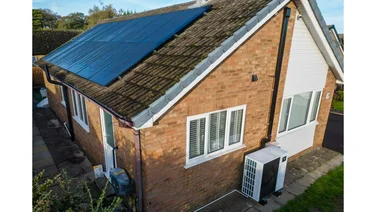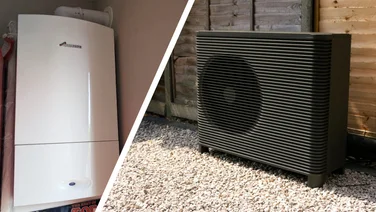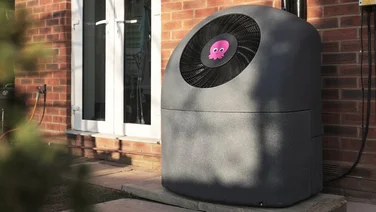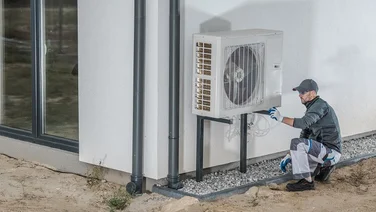✔ Heat pumps produce a low hum that’s between 40 and 60 decibels
✔ Modern heat pumps are no louder than the average boiler or fridge
✔ Ground and water source heat pumps are quieter than air source heat pumps
The price of a heat pump isn’t cheap, so you want to make sure your new investment isn’t a noisy nuisance for you or your neighbours.
That’s why we’re addressing the sounds heat pumps make in this article. We’ll explain the noise levels heat pumps produce, which types are the quietest, and what you can do to make them even quieter.
Just looking to contact a heat pump installer? We can help. Fill in our quotes form, and we’ll pass your details on to professional installers, who can get your home fitted with a heat pump.
What type of central heating do you currently use?
Get started
How loud is a heat pump?
The average heat pump is about as loud as a refrigerator.
Heat pumps produce a low hum, which usually isn’t louder than 40 decibels (dB). This can reach 60 dB when the heat pump is working overtime, on particularly cold days for example.
The myth about heat pumps being noisy comes from the fact that early modern heat pumps were loud. But technology has improved a lot since the mid-20th century, and now produces heat pumps that are compact, highly efficient, and relatively quiet.
Try this nifty test from Octopus Energy to see how loud a heat pump really is:
How does this compare to the noise of a boiler?
The average boiler has a noise level of 40 to 60 dB – a similar range to heat pumps.
However, you’re less likely to notice noise coming from a heat pump than you are to hear sounds coming from a boiler. This is simply due to where the respective units are installed.
Most boilers are fitted within the home, in rooms where you spend a decent amount of time, like your kitchen or laundry room, if you’re lucky enough to have one.
Heat pumps, on the other hand, are installed outside the home, making it much less likely that you’ll hear the small amount of noise they produce.
What’s the loudest type of heat pump?
Air source heat pumps and air-to-air heat pumps are the loudest types of heat pumps. This is mainly because they’re more likely to work overtime to heat a home during cold weather than ground or water source heat pumps.
Why is that? Well, when the outside air is around 0°C, the ground and water temperature is around 10°C. This means water and ground source heat pumps don’t have to work as hard to draw heat from their respective sources in cold weather.
On average, the noise level of ground and water source heat pumps doesn’t go over 42 dB, while air source heat pumps and air-to-air heat pumps noise levels can reach 60 dB in freezing temperatures.
Can you hear a heat pump when you’re inside?
You typically won’t hear a heat pump when you’re inside.
The average heat pump doesn’t produce a noise loud enough for a person to hear it when they’re inside their home, especially if the windows are closed.
The exceptions would be if you have the window open and the heat pump’s unit is installed directly below the window, or if you have particularly badly insulated windows.
And even if you can technically hear your heat pump, it’s unlikely you’ll actually notice you’re hearing it. Think about it: do you notice the sound coming from your fridge when you’re in the kitchen?
What type of central heating do you currently use?
Get started
Can neighbours hear your heat pump?
Your neighbours shouldn’t be able to hear your heat pump.
The legal noise limit for heat pumps, as measured from the nearest neighbouring property, is 42 dB in the UK. This is a similar noise level to a fridge when you’re standing right next to it.
So from their gardens or balconies, the noise level coming from your heat pump should be as quiet as a fridge to your neighbours.
Since most people don’t even notice the noise their fridge makes in their own kitchen, your neighbours shouldn’t notice – or be disturbed by – any noise coming from your heat pump.
Is a heat pump louder in the winter?
Heat pumps can be louder in winter because they have to work harder to generate heat in cold weather.
For context, heat pumps can still draw heat from the outside environment (air, ground, or water) at temperatures as low as -25°C.
However, some of them have to work harder to do this when the temperature drops below freezing. This is why heat pumps, especially air source heat pumps that draw heat from the air, might be louder in the winter.
Ground and water source heat pumps are less likely to work overtime in winter, since the places they draw heat from tend to be warmer than the air during colder months.
Can you make your heat pump quieter?
There are a few measures you can adopt to make your heat pump quieter.
Firstly, you can take steps to stop your heat pump having to work especially hard, as this is typically what leads to it making a louder noise in the first place.
Make sure your home is properly insulated, so the warmth your heat pump generates stays in the house. You might also want to consider setting your thermostat to a lower setting, as you might be demanding too much from your heat pump, causing it to overwork itself.
Secondly, you could consider getting a heat pump cover. Whether covers actually help reduce noise levels from heat pumps is a matter of debate. But they can help protect your heat pump from debris – such as falling leaves – or from icing up in the colder months, both of which can cause the machine to struggle.
What’s the quietest heat pump available?
There are several manufactures that have unveiled ‘extra quiet’ heat pumps in the past few years.
The quietest heat pumps currently include the Logic Air from Ideal Heating, E-Series heat pumps from Daikin, and the EHS Mono HT Quiet heat pump from Samsung.
Most of the heat pumps on this list are air source heat pumps, but on average the quietest types of heat pumps are actually ground source or water heat pumps.
This is because they don’t typically have to work as hard to generate heat in cold weather, and because their external units are far from the home – either buried underground or in a nearby body of water.
Next steps
The key takeaway here is heat pumps aren’t noisy. In fact, they might even be less noisy than a boiler or fridge, since the main part of a heat pump is located outside your home.
If that’s put your worries to rest, and you’re ready to get a heat pump, just fill in our short form. We’ll pass your contact information on to expert heat pump installers, who’ll provide you with quotes.
FAQs
Does a heat pump make a noise all the time?
Heat pumps do not make noise all the time, and the noise levels they make will vary. For example, when your heating is turned off, your heat pump should make very little noise, if any.
When the heat pump is starting up, on turning off, there might be a temporary increase in the noise coming from it, but this should go down pretty quickly to a low hum.
Are heat pumps expensive to run?
Heat pumps are not particularly expensive to run, but they are slightly more expensive than gas boilers. This is because they use electricity, which currently costs more than gas. On average, heat pumps cost around £250 more a year to run than gas boilers.
You can find the full heat pump vs gas boiler comparison on our page.
Are heat pumps worth it?
Heat pumps are worth it if you’re looking for an eco-friendly way to heat your home. While they might be slightly more expensive both to buy and to run than gas boilers, they don’t rely on fossil fuels, which means they’re a future-proof heating solution.
Plus, they last twice as long as boilers, on average.






